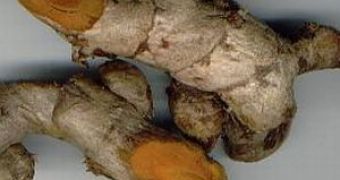Turmeric extract in curry spice has been shown to be very effective against joint inflammation and arthritis by a recent lab study conducted by a team of researchers at the University of Arizona. Turmeric main chemical in the popular spice has been used in Asian traditional medicine for centuries now against inflammatory disorders and trials on mice proved that the compound is really beneficial for people who suffer from arthritis.
Turmeric is commonly known as one of the cheapest spices, that has been used since antiquity as a condiment and also as dye. Originating in South East Asia, the turmeric contains curcuminoids that are the most beneficial ingredients of this plant. Previous studies found that curcuminoids have antioxidant, antibacterial and anti-inflammatory effects upon human body.
The turmeric intake was also found very beneficial in supporting the health of liver, preventing high doses of 'bad' cholesterol in our blood and is being studied by scientists for its tumor-blocking ability. As an anti-cancer agent, turmeric has been found to block the uncontrollable growth of melanoma tumor cells, cells that lead to breast, colon cancer, leukemia etc.
University of Arizona researchers found in lab trials that the curry extract containing curcumin is the 'miracle chemical' which prevented joint inflammation in mice and reversed the onset of rheumatoid arthritis in the animals. Besides blocking the NF-KB protein which increases the production of inflammatory proteins which attack the joints, turmeric may be also very effective against bone loss, preventing osteoporosis in individuals.
Researchers pointed out the fact that the findings of the current study do not link increased curry individual consumption to lower risks of arthritis or osteoporosis. But the results of the trial may be very helpful in developing new, more efficient drugs to treat the fearful conditions.
Commenting on the University of Arizona study, Robert Moots, Professor of Rheumatology at Liverpool University and spokesman for the Arthritis Research Campaign stated: "It will come as no surprise if naturally occurring compounds have a drug-like effect. I do not think there is any evidence that countries that eat a lot of turmeric have a lower frequency of rheumatoid arthritis. So simply eating more spices is not likely to be effective clinically. What is more likely is these results will lead to the targeted development of new compounds."

 14 DAY TRIAL //
14 DAY TRIAL //